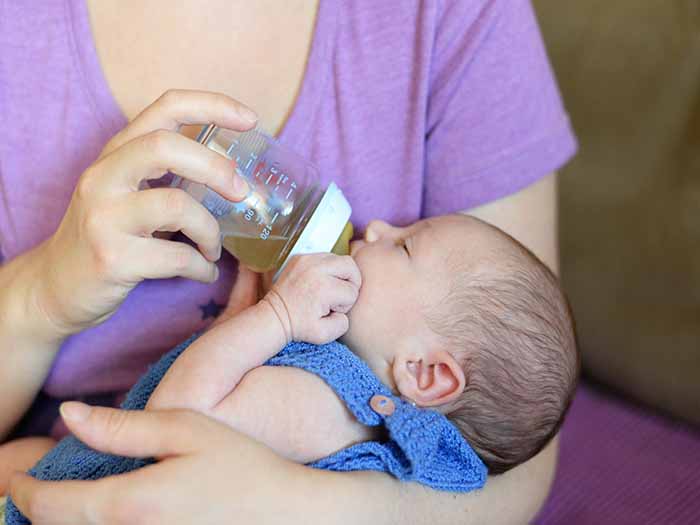Children are the largest consumers of fruit juices and we start them on this journey quite early. Most children start drinking fruit juices before they hit the one-year mark of their life. Fruit juices are seen as a source of vitamins, minerals, and water. However, the American Academy of Pediatrics has laid down detailed guidelines discouraging parents from feeding fruit juices to babies in the first year of life.
When Can Babies Have Juice?
The American Academy of Pediatrics in 2017 came up with detailed guidelines that debunked previously held ideas about fruit juices. Fruit juice is marketed as a natural and healthy source of nutrition. As a baby’s diet expands to include solid food, juices were seen as a means of expanding their water intake. In fact, it was highly recommended for constipation. The best part was that babies loved it, which meant less hassle for the harried parent. [1]
The truth, however, is not as simple. Most commercially available fruit juices for babies contain a high amount of sugar. This not only increases their caloric intake, but it also increases the danger of dental deposits. In addition, juices lack protein and fiber. Their consumption predisposes your baby to inappropriate weight gain. The guidelines by the AAP are as follows:
- For up to 6 months, infants must be fed only breast milk. For mothers who cannot or choose not to breastfeed, infant formula is recommended. However, do make sure that you buy from a well-known, certified brand.
- Breastmilk and infant formula contains all the essential nutrients that an infant needs. There is no nutritional requirement for additional fruit juice.
- The introduction of fruit juice before solid foods runs the risk of replacing it for human milk or infant formula. This can affect the intake of essential nutrients like proteins, vitamins, fats, and minerals. In other words, it can lead to inappropriate calorie consumption, which can result in malnutrition and stunted growth.
- Excessive consumption of juice also increases the chances of sugar deposition on your baby’s teeth.
- If a doctor has prescribed fruit juice for your baby (older than 6 months) or toddler, you should only use a cup.

Are fruit juices good for your baby? Photo Credit: Shutterstock
What You Should Know About Juices For Babies
Should you feed your baby fruit juice when he/she has a tummy upset?
No, say the AAP guidelines. Till a few years ago it was a common practice to feed fruit juice in case of a tummy upset, such as diarrhea. However, the AAP now recommends that only oral electrolyte solutions be used to rehydrate infants and young children. A normal diet should be maintained.
Can fruit juice induce allergies?
Some people believe that certain juices like citrus juice can lead to allergies. Sometimes a baby may develop a rash around the mouth after taking citrus juice. However, this is most likely due to contact dermatitis from the oil in the peel. Allergies to fruit in babies is quite uncommon.
Is fortified juice the better choice?
You will see many baby juices advertised as fortified with essential nutrients like calcium and vitamin C. While these are certainly important, breastmilk or infant milk contains all the nutrients your baby needs. Even for toddlers, fruit juice should not be your first choice. It is better to give them milk and whole fruits.
When can you introduce fruit juice?
You can gradually introduce fruit juices to toddlers, over 1 year of age. However, it is always better to give them whole foods. It should be part of a well-balanced diet. Keep in mind that fruit drinks are not the same as fruit juice.
What kind of fruit juice should you give your toddler?
Always give your child freshly prepared or 100 percent reconstituted fruit juice. If you are buying commercial baby juices, make sure it certified, pasteurized and free of chemicals, sugars, and other additives. Unpasteurized juice may contain pathogens.
How should you introduce fruits to your baby’s diet?
Fruits should be added whole to an infant’s diet. It can be mashed or pureed. You can mash a banana into pulp. Apples can be steamed and then pureed. Ideally, introduce only one food at a time.
How to reduce your child’s fruit juice intake?
If your child insists on drinking only fruit juice, you must start on changing his/her habits. Some tips for managing this are:
- Give fruits instead of juice.
- Dilute the juice with water.
- Give water with meals.
- Cut the fruits in interesting shapes.
- Most children will reject new food. The secret lies in persistence. Keep trying and letting them see how much you enjoy eating fresh fruits. Children learn most by example.
